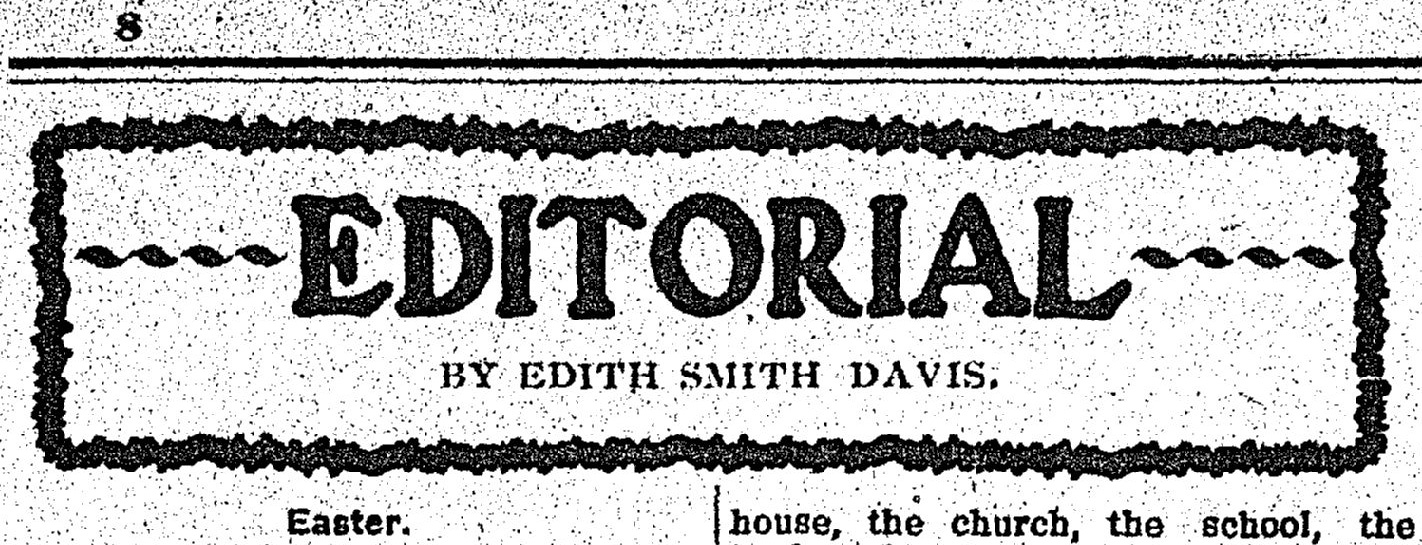“Easter.” from the April 2, 1904 Door County Democrat
Easter.
The founder of the Christian religion fixed no festivities or holidays, neither is there any trace of the celebration of Easter, as a festival, in the New Testament, or in the writings of the apostolic fathers. They were too much concerned about the greater things of faith, and purpose, and character. For a time no doubt, both the Jewish Sabbath and the day we call Sunday, were observed as holy days; one, by virtue of the tradition of the Jews, and the other, for its constantly reminding the Christian believers of the resurrection of their Lord. But the human instinct everywhere craves the commemoration of marked epochs in the personal, social, ecclesiastical, or national life; and it was very natural that the Passover, ennobled by the thought of Christ, the true Paschal Lamb, the first fruits of the dead, should be celebrated and become the Christian Easter.
But a difference as to the time of its observance speedily sprang up. The point at issue was the date of the termination of the Paschal fast. The Jewish Christians, believed with the other Jews, that the fast ended at evening, on the fourteenth day of the moon, and the Easter festival immediately followed irrespective of the day of the week. The Gentile Christians, on the other hand, felt that the first day of the week was identified with the resurrection festival, and the preceding Friday was the commemoration of the crucifixion, irrespective of the day of the month, the fast continuing until the midnight of Saturday.
With one, it was the observance of the day of the month; with the other, it was the observance of the day of the week. Tho chief point was the keeping or not keeping the fourteenth day of the moon corresponding to that of the month, Nisan. Of course from this diversity of usage dissensions and controversies arose. These were gradually brought to an end by the verdict of the Church of Rome. This placed the observance of the crucifixion on a Friday and the resurrection upon the following Sunday. It was also agreed that Easter should be kept upon one and the same day throughout the world, but nothing was said as to the determination of the day. This was left to be calculated at Alexandria, the home of astronomical science. But it was some centuries before all discrepancies ceased, for a more intricate question arose, how the full moon on which Easter depended was to be predicted.
According to the Council of Nicea, Easter was to be determined from the following conditions: 1st, Easter must be celebrated on a Sunday; 2nd, this Sunday must follow the fourteenth day of the Paschal moon, so that if the 14th of the Paschal moon falls on a Sunday, then Easter must be celebration on the Sunday following; 3rd, the Paschal moon is that of which the 14th day falls on, or next follows the day of the vernal equinox; 4th, the equinox is fixed invariably in the calendar on the 21st of March. From these conditions it follows that the 14th of the Paschal moon cannot happen before the 21st of March and that Easter, in consequence, cannot happen before the 22nd of March. Or if the fourteenth of the moon fall, at the latest, on the 18th of April, or twenty-nine days after the 20th of March, and this be Sunday, then Easter must be celebrated on the following Sunday, or the 25th of April which is the latest that it can be celebrated.
But after all, the time is of little consequence, for it is the great event, the stupendous event of all the ages, that makes Easter mean more to the Christian church than any other day of the year. It is the central fact of our Christian faith, for we all realize that if Christ be not risen from the dead, then is our faith vain. But upon Easter morning there comes a sense of freedom and openness, of the largeness of life and of the liveness of God. We fill our churches with flowers, for they have taken the infinite and mysterious forces of nature, and transformed them into clear shapes of visible beauty, and we sing the immeasurable truths of life and immortality, for Christ is risen! Christ is Risen! A living Christ! It is the old, ever new Easter truth! Ho liveth; He was dead; He is alive for evermore. And the prayer of Frances Ridley Havergal becomes the prayer of all of our hearts:
Oh, let me know
The power of Thy resurrection;
Oh, let me show
Thy risen life in calm and clear reflection;
Oh, let me soar
Where Thou, my Savior Christ, art gone before;
In mind and heart
Let me dwell always, only, where Thou art.
Oh, let me give
Out of the gifts Thou freely givest;
Oh, let me live
With life abundantly because Thou livest;
Oh, make me shine
In darkest places, for Thy light is mine;
Oh, let me be
A faithful witness for Thy truth and Thee.
Oh, let me show
The strong reality of gospel story;
Oh, let me go
From strength to strength, from glory unto glory;
Oh, let me sing
For very joy, because Thou art my King;
Oh, let me praise
Thy love and faithfulness through all my days.
Courtesy of the Door County Library Newspaper Archive
Easter related articles
https://doorcounty.substack.com/t/easter



